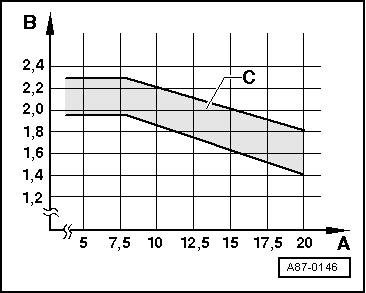Octavia Mk1
|
|

|
| Possible deviation from the specified value | Possible cause of fault | Rectifying fault | ||||||||||||||||||||||||
| Too little refrigerant in the circuit or expansion valve defective. |
| ||||||||||||||||||||||||
|
 Note
Note| If no fault is found for this complaint, clean the refrigerant circuit → Chapter. |
| Possible deviation from the specified value | Possible cause of fault | Rectifying fault | ||||||||||||||||||||||||
|
|
|
 Note
Note| If the function is not in order after cleaning the refrigerant circuit, the expansion valve must be replaced. |
| Possible deviation from the specified value | Possible cause of fault | Rectifying fault | ||||||||||||||||
|
|
| ||||||||||||||||
|
 Note
Note| t | If problems arise due to humidity in the refrigerant circuit, only after a longer operating time or only occasionally (the low pressure drops below the specified value and the evaporator ices up), it is adequate to replace the dessicator (the volume of refrigerant oil must be adapted). Subsequently the refrigerant circuit must be evacuated for at least 3 hours. |
| t | First of all, it is not required to clean the refrigerant circuit for this complaint (to flush with refrigerant R134a or to blow through with compressed air and nitrogen), as normally only a small amount of humidity is present in the system which can be removed through a longer period of evacuation. |
| Possible deviation from the specified value | Possible cause of fault | Rectifying fault | ||||||||||||||||||||||||||||
|
|
|
 Note
Note| If the function of the air conditioning system is not O.K. when repeating the test, reexchange expansion valve and clean refrigerant circuit → Chapter. Subsequently replace AC compressor and fluid reservoir with dessicator or only dessicator (specifically designed for vehicles). |
| Possible deviation from the specified value | Possible cause of fault | Rectifying fault | ||||||||||
| AC compressor defective. |
|
| Possible deviation from the specified value | Possible cause of fault | Rectifying fault | ||||||||||||
| Expansion valve or AC compressor defective. |
|
 Note
Note| t | If the function of the air conditioning system is not O.K. when repeating the test, reexchange expansion valve and clean refrigerant circuit → Chapter. Subsequently replace AC compressor and fluid reservoir with dessicator or only dessicator (specifically designed for vehicles). |
| t | If this fault occurs, it can happen that the evaporator ices up although the volume of refrigerant in the circuit is O.K. |
| Possible deviation from the specified value | Possible cause of fault | Rectifying fault | ||||||||
| Too much refrigerant oil in the circuit. |
| ||||||||
|
|
 Note
Note| t | Over-filling with refrigerant oil can occur if, for example, the AC compressor was replaced without adapting the volume of refrigerant oil. |
| t | In case too much refrigerant oil is present in the refrigerant circuit, the AC compressor must be emptied and the fluid reservoir with the dessicator or only the dessicator (specifically designed for vehicles) must be replaced. After the refrigerant circuit was cleaned → Chapter, fill the correct volume of refrigerant oil into the circuit. |
